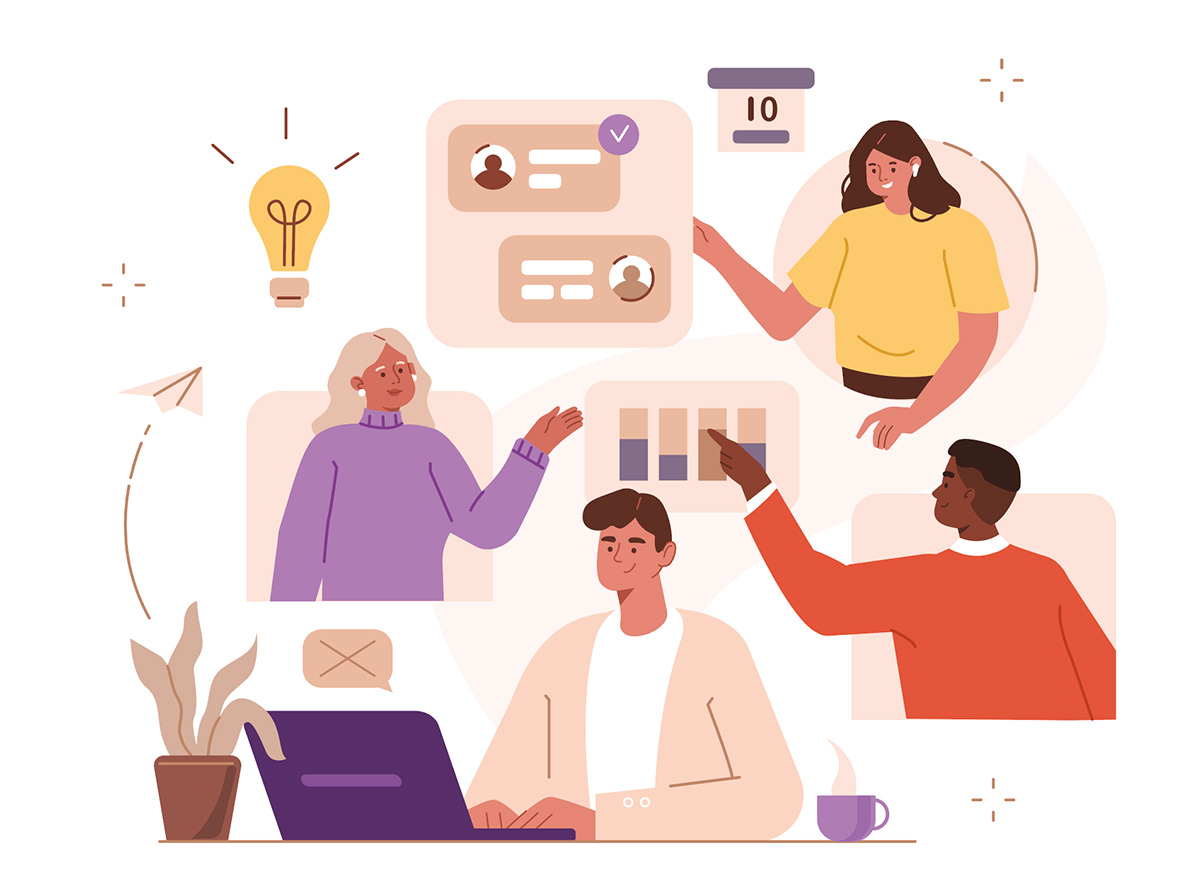In a hybrid working environment, leaders need to foster a sense of cohesion.
The prolonged nature of the pandemic has meant that our most natural means of social connection have been revoked. From dating to productivity, we have had to trust more in means of quantifying and codifying human behaviour – and we have been forced to find new sources of personal resilience as we have navigated novel ways of working and connecting. The shift to hybrid working as a new norm seems clear, and it offers organizations many benefits – not only in a virus-stricken world. Yet concerns abound. How do teams sustain the ability to innovate? How are ideas shared effectively and priorities understood across the organization? How do those in new roles build a sense of belonging?
Meaningful connection in human relationships is based on acknowledging that the needs of another matter. Individuals will always go above and beyond for a cause that matters deeply to them. It is what allows two or more individuals to move from ‘me’ to ‘we’. Progress has always been the consequence of a group of committed people coming together to find bold new ways forward. As we find our way out of the pandemic – or, in many parts of the world, continue to wrestle with its devastating effects – we must rely more than ever on these fundamental truths about why and how people make connections. They will be fundamental for success in the uncertain territory of hybrid working environments.
There are several ways for leaders to leverage what is deeply and truly human about us, individually and collectively, to unlock new ways of engaging, developing and retaining a productive workforce. Here are three of the most important.
Angle towards vision, not obstacle
In the initial stages of the pandemic, many organizations focused on the immediate problems of cash flow and supply chain disruption. Many more are now angled towards a positive vision for the future, reinforced by the expectations of employees, customers and investors that organizations respond to systemic issues such as climate change and social inequality. Bold choices grounded in a strong sense of purpose and conviction will be a defining feature of those who create momentum and alignment on the way forward. Creative and engaging storytelling from authentic and compassionate leaders will be particularly important for employees who may be experiencing burnout, disillusionment, trauma and loneliness.
Connect with the person, not the worker
Creating cohesion in hybrid teams will require ongoing management of the tensions between the urgent work of today and the important work of the long term. Employers must pay close attention to the new role they are inviting people to play, which goes beyond getting tasks done, to being champions of a cause that’s worth their time and effort. After all, people want to be a part of a force for change; they want to see what they can contribute. Yvon and Malinda Chouinard, founders of outdoor wear specialist Patagonia, started out to make better climbing equipment than what was available, working with and for themselves and their friends. To this day, the company maintains the spirit of peer production. Staff are also paid for up to two months to work in communities threatened by environmental vandalism. By continuing to act like a group of activists, there is no distinguishable difference between person and worker.
Nurture and grow performance through teams, not process
When individuals start pursuing goals they want to achieve, two things happen. First, others see how much those involved care, and want to join in. Second, the joy and excitement of moving towards the objective overtakes the fear of failure. Achieving the bold vision will not just require multiple individuals to champion the cause. It will require dedication and intention from those individuals when they come together, so they assign themselves work aligned to what they want to master, and support others in achieving their own mastery. This requires a new type of connection among individuals: one that is less optimized for efficiency, and more conducive to creativity. It requires individuals to be open about what they want to achieve, and what helps them to do their best work. Development is key – and that includes learning from peers within the team.
Many of the institutions and structures that formed the basis for success during industrialization are being challenged in the new era of digitalization. As we transition, sentiment and behaviours are likely to change erratically. The scale of change poses fundamental questions about what our organizations are here to do, the legacies that they create for society as a whole, and what they need to leave behind – or become – in order to make progress.
Building trust through open dialogue at multiple levels, and encouraging individuals to explore their deepest challenges in a safe environment, are important first steps to unlocking the power of communities in organizations today. In the era of hybrid working, leaders need to focus more than ever on building and sustaining team cohesion. Consistency, authenticity and honesty matter more than ever.




